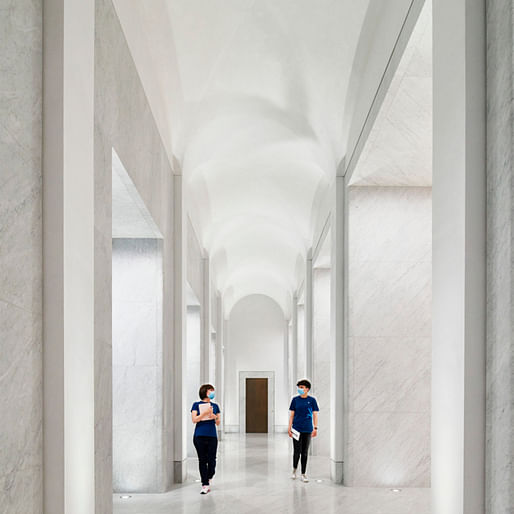
Foster + Partners and Apple have collaborated to create a new Apple store that brings a nineteenth-century site back to life in Rome. Situated on Via del Corso, one of the most vibrant streets in the city, Apple Via Del Corso restores the Palazzo Marignoli, uncovering historic features and opening up a central courtyard.
The design of the store reveals the building’s compelling and multi-layered history by unveiling painted ceilings and frescoes from the 1890s juxtaposed with modern graffiti artworks from the 1950s.
Stefan Behling, Head of Studio at Foster + Partners, said: “The joy of the project was to peel back and rediscover the layers of history throughout the building and revealing its eclectic past, which ranges from the historic painted ceilings and the frescoes by Fabio Cipolla, both from the 1890s, to the more recent graffiti artworks by Afro Basaldella. Palazzo Marignoli has seen so much throughout its history, and we feel truly privileged to be able to be part of its newest phase of life.”
Apple Via Del Corso is located on the site of a sixteenth-century convent. The current Palazzo Marignoli was constructed in 1873, designed by renowned architect Salvatore Bianchi. It served as the home for Marquis Filippo Marignoli. A second renovation by architect Giulo Podesti saw the addition of the building’s current main facade. From 1890 to 1955, Palazzo Marignoli housed the Caffè Aragno, one of Rome’s most famous gathering locations for artists, writers, and actors.
The building is organized around a large courtyard that was opened up to be used by the public and to greet visitors upon entry into the store. Native Camphora trees were added to the courtyard making the space remnant of the former convent and its garden. They also function to create a welcoming environment for visitors, offering shade and respite from the busy shopping street.

Large glass windows on the restored main facade facing Via del Corso allow natural light to penetrate the interior. Upon entry into the store, visitors are guided through a historic passage that leads to the courtyard. The arches and vaults of the central passage are lined with Carrara stone, carefully selected to match the existing marble and to create dramatic vistas that lead to the grand staircase.
The monumental staircase dates back to 1888 and was built originally by Marignoli. It was restored with its original Carrara marble detailing. The original skylight, which was built over during a previous refurbishment, has been restored to provide artificial light that matches the tone of natural daylight within the grand stairwell. On the first floor, a long corridor connects a forum space with a Genius Bar and three retail spaces. The forum-style space will be used for community events, situated in what used to be the Palazzo’s ballroom.
In the space adjacent to the former ballroom, an elaborate geometrically patterned, hand-painted ceiling, which was discovered during the course of construction, is featured. A team of conservators restored the ceiling piece. Linking all of these rooms is a gallery space that opens up onto a landscaped terrace. Inspired by historic Roman roof terraces, the space is filled with jasmine vines and olive trees and looks down into the courtyard.
With Apple Via Del Corso, the Palazzo Marignoli is brought into its next phase of life through the thoughtful marriage of past and future.
2 Comments
Beautiful project.
"...making the space remnant of the former convent and its garden."?
Reminiscent, maybe? Anyway, how about some benches in the courtyard for visitors to enjoy the space?
The interior restoration is quite well done except for the standard Apple tables that go back at least 20 years and were never attractive to begin with. Also what's with the egg-crate stools in the last photo? Are they trying to make their customers uncomfortable?
Block this user
Are you sure you want to block this user and hide all related comments throughout the site?
Archinect
This is your first comment on Archinect. Your comment will be visible once approved.